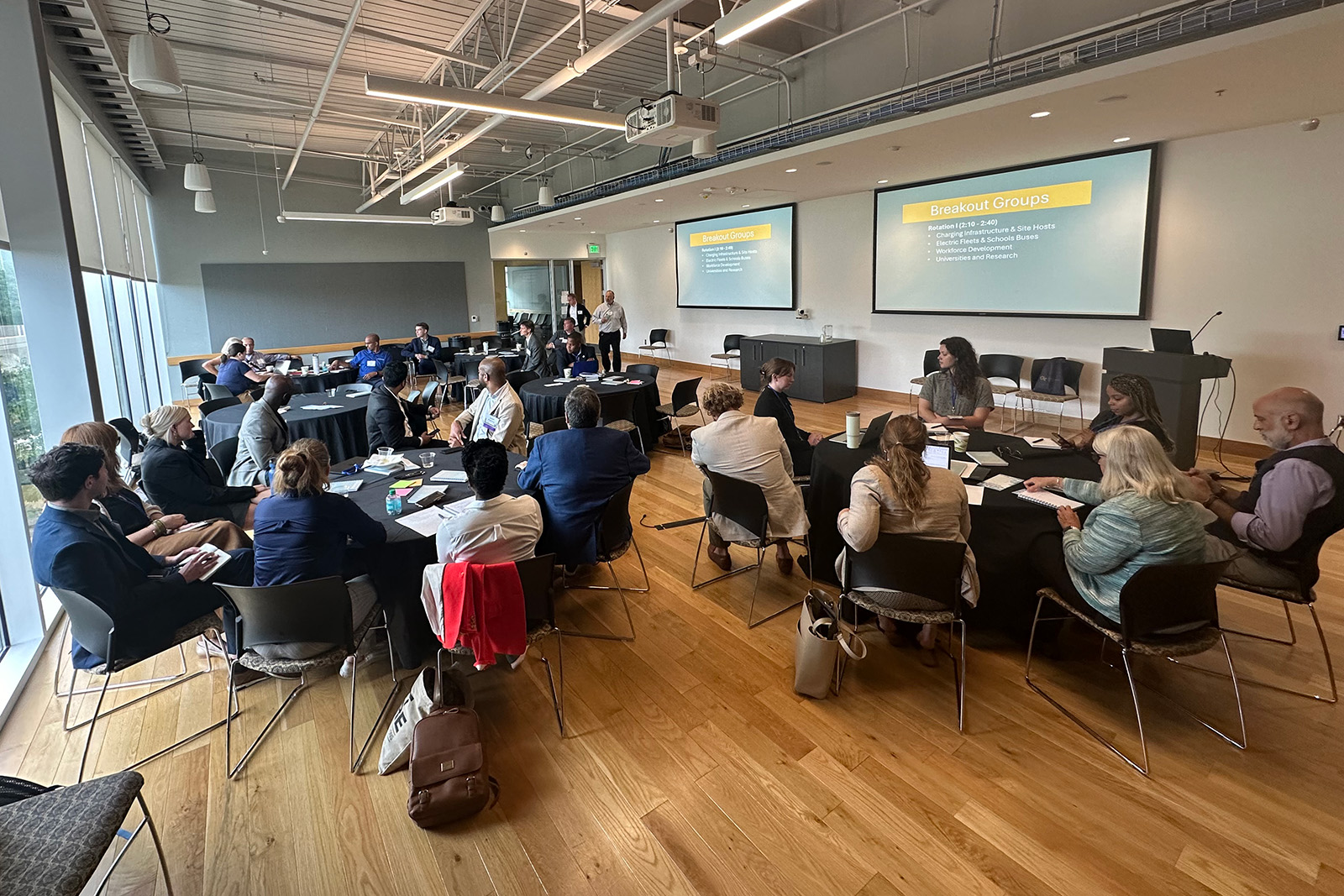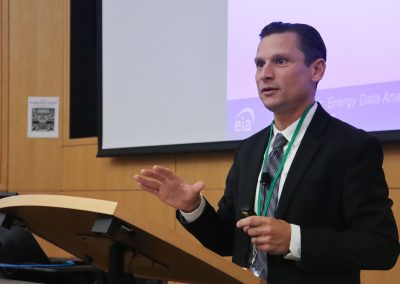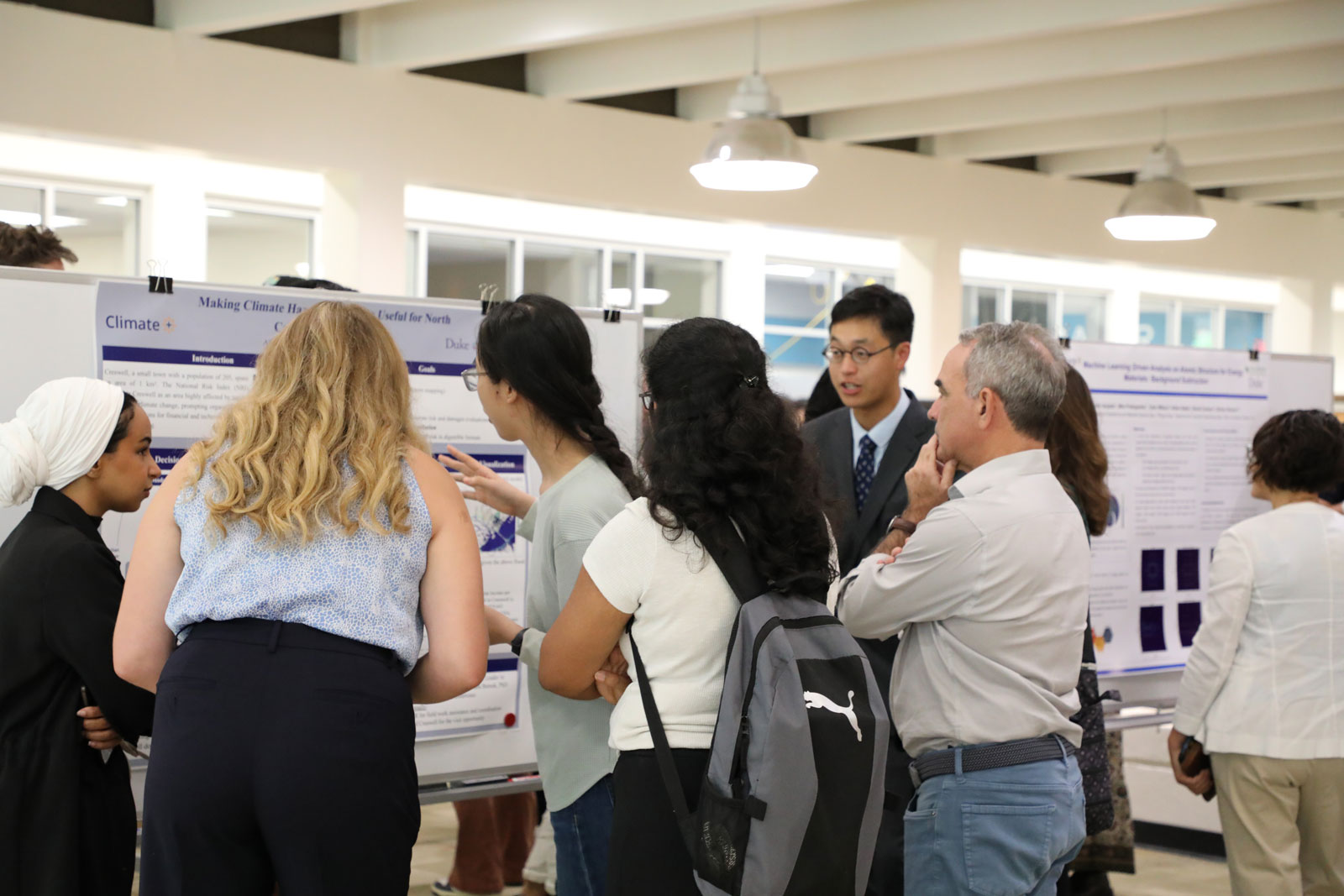Data-Driven Climate Solutions
Making sound decisions about climate solutions depends on timely, reliable, and accessible data. Nicholas Institute experts are making it easier to use data to identify high-impact interventions, track their effectiveness, and target areas for improvement.
Highlight
Nicholas Institute Paves the Road for Regional Transportation Electrification
The Nicholas Institute is advancing adoption of electric vehicles (EVs) through a focus on data analytics, emerging best practices in the field, and stakeholder collaborations. A key initiative is the Southeast Electric Transportation Regional Initiative (SETRI), a multisector network facilitated by the Nicholas Institute, the Georgia Tech Strategic Energy Institute, and key partners. SETRI seeks to convene, collaborate with, and inform stakeholders on transportation electrification across the region.
Convening Regional Leaders
More than 70 representatives from government agencies, automakers, utilities, universities, nongovernmental organizations, and more met in Atlanta and virtually in June 2024 to share project updates and challenges about electric mobility in the Southeast. The gathering was the first in-person meeting of SETRI.
Tracking Growth of Charging Infrastructure
The public and private sectors in the Southeast are making substantial investments in charging infrastructure to meet the rising demand for EVs. A pair of Nicholas Institute reports captures the growth of charging and explores trends in 12 states.
Read key takeaways about charging ports in the Southeast →
Building an EV Workforce
Advancement of the EV industry in the Southeast creates a substantial need for a skilled workforce to build and service these vehicles, as well as install and maintain charging infrastructure. The National Association of State Energy Officials, the American Association of State Highway and Transportation Officials, and the Nicholas Institute collaborated to study EV-specific workforce development efforts across 10 states and provide policy and program options for state agencies.
To advance an equitable transition to electric transportation in the Southeast, we need to work together across communities, companies, and campuses throughout the region. Our goal is for SETRI to advance such collaborations and foster information-sharing across sectors and states.
Building Emissions Matter
%
of global end-use energy consumption
%
of energy sector emissions
%
of all emissions come from combusting fossil fuels in homes
Highlight
Providing Emissions Estimates for Every Building on Earth
This year, Duke University joined Climate TRACE. This nonprofit coalition is working to make meaningful climate action faster and easier by building a timely, open, and accessible inventory of exactly where greenhouse gas emissions are coming from. Governments, companies, and others seeking to decrease emissions can use this information to make impactful decisions.
The Energy Data Analytics Lab, housed at the Nicholas Institute, leads Duke’s work on estimating direct emissions from the buildings sector, including both residential and nonresidential buildings (including retail, warehouses, hospitals, schools, and more).
Duke experts are providing data on these emissions for every square kilometer over the surface of the Earth. They use data generated by applying machine learning techniques to satellite imagery to determine where each building is—and its size. Then they combine this data with regional statistics around energy consumption and fuel mix to estimate emissions. The lab’s building-sector emissions estimates will be added to the Climate TRACE database in late 2024—stay tuned!
Energy Data Analytics Symposium
How can data science tools, including artificial intelligence, help make energy systems more accessible, affordable, reliable, and environmentally sustainable? This single-track, in-person event explored leading approaches addressing this question, highlighting the work of established experts and energy professionals as well as emerging scholars in the field. The symposium was co-hosted by the Energy Analysis and Policy Program at the University of Wisconsin-Madison, and funding support was provided by the Alfred P. Sloan Foundation and NASA.
attendees
in-person presentations
lightning talks by emerging scholars and professionals
Education Spotlight
Students Learn to Apply Data Science Techniques to Tackle Climate Challenges
In summer 2024, 34 students on eight project teams used data science techniques to research climate challenges and potential solutions as part of Duke University’s Climate+ program. They studied topics like saltwater intrusion, energy materials, rainfall predictions, and links between climate and health.
Like all students in the broader Data+ program, Climate+ students have opportunities to learn from data science professionals across numerous industries and from other student teams’ experiences and insights. In addition, Climate+ students participate in a series of unique workshops to enhance their climate literacy, data science and interdisciplinary communication skills.
Climate+ is offered by the Nicholas Institute in partnership with the Rhodes Information Initiative at Duke. The program is aligned with the goals of the Duke Climate Commitment, and funding for Climate+ comes from The Duke Endowment and the Rhodes Information Initiative.



![Screenshot 2024-09-24 175304[77] Map of NC with more detailed map of Triangle area. Text: High-resolution CO2 emissions from buildings in the Triangle. Legend explains color coding to indicate metric tons of CO2 emissions.](https://sites.nicholasinstitute.duke.edu/annual-report/wp-content/uploads/sites/11/2024/09/Screenshot-2024-09-24-17530477.png)




